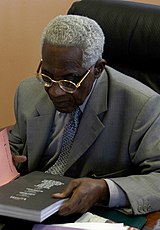Aimé Cesaire
| Aimé Fernand David Césaire | |
|---|---|

Aimé Césaire in 2003
|
|
| Born |
Claude Pierre 26 June 1913 Basse-Pointe, Martinique, France |
| Died | 17 April 2008 (aged 94) Fort-de-France, Martinique, France |
| Alma mater | École Normale Supérieure, University of Paris |
| Known for | Poet, politician |
| Political party | Parti Progressiste Martiniquais |
| Spouse(s) | Suzanne Roussi |
Aimé Fernand David Césaire (26 June 1913 – 17 April 2008) was a Francophone and French poet, author and politician from Martinique. He was "one of the founders of the négritude movement in Francophone literature". He wrote such works as Une Tempête, a response to Shakespeare's play The Tempest, and Discours sur le colonialisme (Discourse on Colonialism), an essay describing the strife between the colonizers and the colonized. His works have been translated into many languages.
Aimé Césaire was born in Basse-Pointe, Martinique, in 1913. He considered himself of Igbo descent from Nigeria, and considered his first name Aimé a retention of an Igbo name. He traveled to Paris to attend the Lycée Louis-le-Grand on an educational scholarship. In Paris, Césaire, who in 1935 passed an entrance exam for the École Normale Supérieure, created, with Léopold Sédar Senghor and Léon Damas, the literary review L'Étudiant Noir (The Black Student). In 1936, Césaire began work on his long poem Cahier d'un retour au pays natal, a vivid and powerful depiction of the ambiguities of Caribbean life and culture in the New World and this upon returning home to Martinique.
Césaire married fellow Martinican student Suzanne Roussi in 1937. Together they moved back to Martinique in 1939 with their young son. Césaire became a teacher at the Lycée Schoelcher in Fort-de-France, where he taught Frantz Fanon and served as an inspiration for, but did not teach, Édouard Glissant. Césaire would become a great influence for Fanon as both a mentor and a contemporary throughout Fanon's short life.
...
Wikipedia
